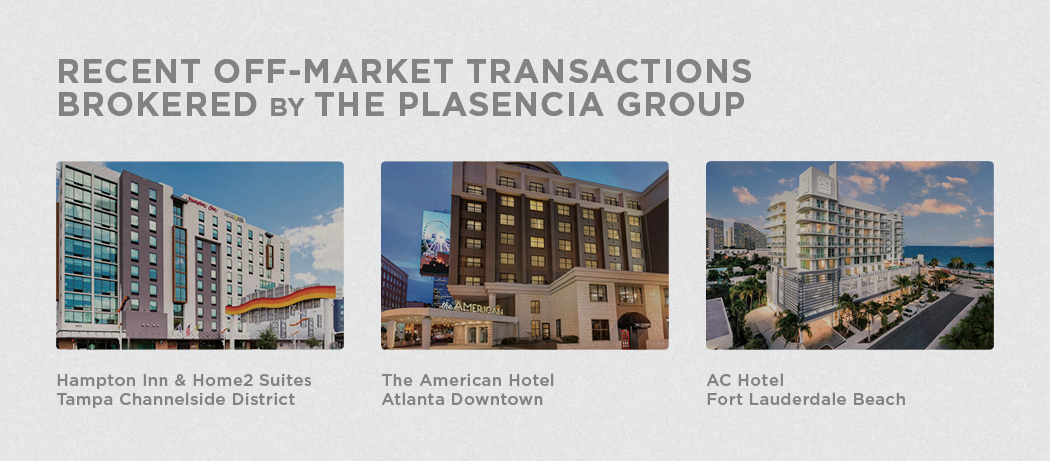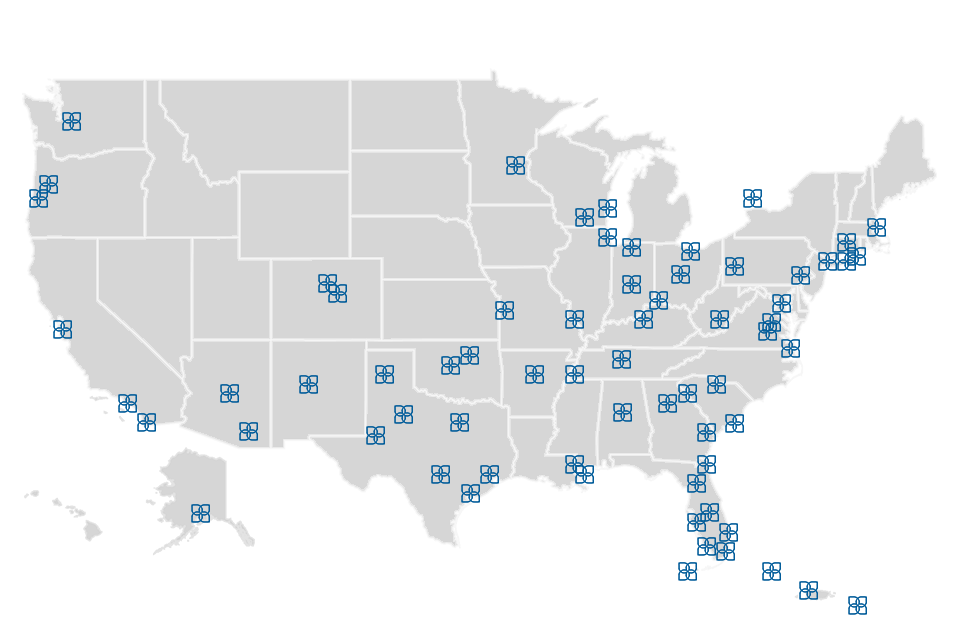January 31, 2023 – By Chris Plasencia, Managing Director
Review and download the PDF version of Hospitality Industry Insights – Go “Off-Market” with The Plasencia Group
Shepherding a hotel through a disposition today requires more expertise than ever before, in light of buyers’ struggles to finance acquisitions. Gone are the days of the passive, cookie-cutter marketing process, kicked off by the midnight email blast to thousands and characterized by a reactive, not proactive, approach to outreach. Brokers’ deal books at industry conferences, chock-full of recycled listings, are emblematic of this approach. Instead, we find ourselves turning to alternative marketing techniques, including off-market disposition processes.
What do we mean by “off-market”?
Essentially, “off-market” entails reaching out to a limited group of prospects with the expectation of immediate attention by and quick feedback from those investors. This means that launching an off-market process requires strong knowledge of the investor base for a particular asset to ensure that the most likely buyers are apprised of the opportunity.
Several factors should be considered when building an outreach list for an off-market process. We typically look for investors that satisfy at least several of the following criteria:
- Already own hotels or other real estate in the subject market, submarket, or competitive set
- Have recently voiced interest in deploying capital into the submarket
- Participated competitively in recent sales processes in the market or a similar market
- Have a concentration of similar hotels within their portfolio
- Have been active buyers recently
- Have equity capital in-hand, as opposed to having to raise it
- Have the ability to close all-cash, or have a dedicated relationship lender that will step up when opportunity beckons
This sort of real-time data is gleaned from industry resources, and most importantly, from frequent dialogue with the most active investors in the hospitality investment space.

How does an off-market disposition process work?
In addition to its audience, the substance of an off-market process is also pared back. The typical widespread launch by generic email is replaced with a direct, thorough telephone conversation or face-to-face meeting. A scaled-down executive summary can take the place of a full-blown offering memorandum. A data room comprised of several years’ worth of P&Ls and STRs, and perhaps a market overview offers the foundation needed for investors to complete their desktop underwriting, with additional information and a tour only to follow a preliminary indication of interest. Some off-market processes may culminate with a formal call for offers, but many move at their own quick pace, with feedback arriving from the hand-picked field only a few weeks after the opportunity was initially introduced. To you investors who find yourselves on the short list of an off-market process: dig in diligently! You are, by nature, already a “finalist,” and the seller expects pricing feedback.
There are several reasons to forego a broadly marketed approach in favor of an off-market approach:
- Generally, because outreach is focused on a limited, preselected audience (who are aware that they are on a short list), the level of investor engagement is vastly enhanced. As a result of this very focused path to buyer selection, an off-market approach should yield a higher proportion of offers than a broad process; it’s not uncommon for over half of the target audience to provide an indication of interest.
- Additionally, off-market processes cause minimal disruption when compared to fully marketed offerings that potentially interfere with property operations and subject hotel management teams to countless investor questions, numerous tours, and the occasional tire-kicker who shows up at the front desk unannounced.
- Certain owners may prefer the off-market approach to minimize “shop wear” – the stigma that sometimes envelops a property that was underwritten by a vast portion of the investor community yet did not trade.
- Off-market approaches are also substantially quicker than broad marketing processes. Eliminating the standard marketing period, traditionally used to identify serious investors, and instead beginning with a list of targeted investors, can shorten a process by 25% to 50%.
- Sometimes, for a hotel with operational complications, atypical encumbrances, a choppy operating history, or a challenging location, the true size of the market does can be counted on two hands. The same often goes for a property with a gargantuan price tag, where only a select few are capable of taking the deal down.
Ultimately, choosing an off-market approach prioritizes speed, certainty, and minimized disruption over the possibility of a higher price from an outlier prospect in the larger field.
Is An Off-market Deal a good fit for Your Asset?
For our firm, “off-market” is not merely a descriptor we throw around to gin up more interest or to convince our client the marketing process will not be disruptive to the property. Rather, it is a meaningful tool to see a hotel disposition through to a successful conclusion. If you are considering selling a hotel and are unsure of the best way to go about it, especially considering the current inactivity of today’s market, please give us a call to discuss whether an off-market approach, or another marketing method, is appropriate for your investment goals.
For more valuable hospitality industry news and market analysis from The Plasencia Group, be sure to opt-in to our news and communications list.


